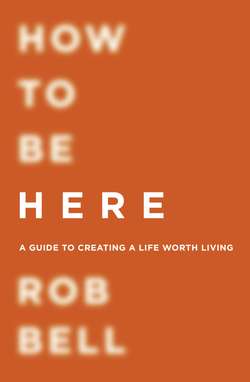Читать книгу How To Be Here - Rob Bell - Страница 13
PART 2 The Blank Page
ОглавлениеWhat you know makes you unique in some other way. Be brave. Map the enemy’s positions, come back, tell us all you know. And remember that plumbers in space is not such a bad setup for a story.
—Stephen King
I once had an idea for a book called Fire in the Wine.
I had a big black sketchbook on my shelf and I had this insight about the human body and soil and the food we eat and how when we die we’re buried in the earth, which is what we do with seeds that then grow into the food that we consume that sustains our bodies that will be buried when we die … so I made a drawing to represent all of that.
It was just one sketch.
And then a few months later I came across a quote which somehow connected with that drawing that I had copied on the next page of that big black sketchbook.
And then something happened to me that reminded me of that first sketch and that quote which connected to something I’d read in a magazine around that time.
This continued for several years until I could see a book emerging on the pages of that sketchbook, a book I decided to call Fire in the Wine. As I began to organize the content of Fire in the Wine into chapters I realized that I needed to do some reading to give more breadth and depth to the ideas I was working on. So I read. And read. And read. Thousands of pages. And whenever I came across something that spurred a thought or clarified something I’d been thinking about, I underlined it or marked the page. I then went back through those books and took notes on what I’d underlined, copying each idea onto a 3×5 card.
Which took months.
I then laid all those cards out on the floor and looked for patterns and connections and common threads. There were a lot of those cards, and so just out of curiosity I started counting them. I lost track somewhere past six hundred.
Once the cards were organized, I started writing the book, crafting the chapters, creating the introduction, working on the first draft.
Which took months.
I turned in that first draft to my editor, who visited me a few weeks later to talk about the book—the book that, he informed me, didn’t appear to have a clear point.
I then rearranged the entire thing, moving the start to the end and the end to the beginning.
Which took months.
Months in which it became clear that the book wasn’t really about fire in the wine, it was about something else. I kept using a phrase that I didn’t realize I was repeating until my editor pointed it out. That phrase seemed like it should be the title of the book, so I changed the name of the book. Changing the name then shifted some of the central themes, which meant I had to go back through and rearrange the entire book, moving the quantum physics part to the beginning and organizing the rest of the book around seven central themes.
Which took months.
By the fifth draft, I had lost my way. I couldn’t figure out how to take all that content and make it flow. It was like I had all the notes but no melody. I’d sit there and stare at the computer screen for hours, trying to figure out how to make it flow.
Some days I’d write one new sentence.
One.
Other days I’d write one new sentence, and then, at the end of the day, I’d delete that one sentence.
Many, many mornings—by this point well over a year of mornings—I’d get up and make my kids breakfast and take them to school and then I’d sit down at my desk and go through the book AGAIN, looking for even the slightest bit of help to find a way forward.
And that’s when the head games started. You know about head games—those voices in your head, questioning who you are and what you’re doing. Telling you you’re no good.
This was the sixth book I’d written, so you’d think it wouldn’t have been so hard. But it was. It was the most difficult thing I’d ever made. It didn’t matter that I’d done it before. It didn’t matter that I’d done months and months of outlining and arranging. It didn’t matter that I cared deeply about the content.
The blinking line can be brutal.
Because the blinking line doesn’t just taunt you with all the possibilities that are before you, the potential, all that you sense could exist but isn’t yet because you haven’t created it. The blinking line also asks a question:
Who are you to do this?
And that question can be paralyzing. It can prevent us from overcoming inertia. It can cause crippling doubt and stress. It can keep us stuck on the couch while life passes us by.
